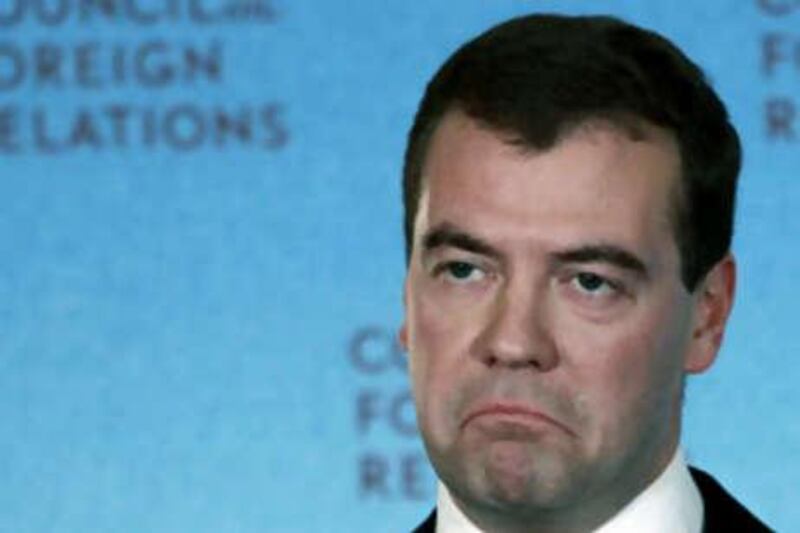WASHINGTON // The Russian president Dmitri Medvedev has called for talks with Barack Obama as soon as possible after the US president-elect takes the oath of office. On his first visit to the United States since becoming Russia's president in May, Mr Medvedev reached out to the incoming US administration. He said yesterday there was a lack of trust between Russia and the United States, but he hoped this would change when Mr Obama became president Jan 20.
Mr Medvedev said it was "in our power" for Russian-American relations to be "truly a partnership." He said it was not particularly important what issue he and Mr Obama chose to discuss at their first meeting. "The main thing is that the meeting takes place and that it takes place quickly," said Mr Medvedev, who was in Washington for the global financial summit. But he suggested that US plans to build a missile defence system in Eastern Europe would be a good place to start. Just hours after Mr Obama won the presidential election, Mr Medvedev issued a challenge, warning that Russia would move short-range missiles to NATO's borders to "neutralise" the missile defence system if necessary.
Mr Medvedev has since backed off slightly. He stressed yesterday that Russia would not act unless the United States took the first step and expressed hope that the Obama administration will be open to negotiations. "I hope that the new president, the new administration will have a desire to discuss this," Mr Medvedev told members of the Council on Foreign Relations. "At least the first signals that we have received indicate that our new partners are thinking about the problems and do not simply plan to rubber stamp the plans."
The Russian president gave a short speech and then settled into an armchair next to the former Secretary of State Madeleine Albright to continue the discussion with her. The choice of Ms Albright carried additional significance since she acted as a surrogate for Mr Obama at the summit. When asked about the missile defence system, Mr Medvedev returned to the lectern. He said he would not speak "as emotionally" on the issue as the French President Nicolas Sarkozy but needed to stand to address the issue properly.
Mr Sarkozy caused waves by criticising the planned missile defence system on Friday, saying it would not make Europe safer. But he backed down yesterday. The Bush administration has insisted the planned missile defence system in Poland and the Czech Republic is aimed at protecting Europe from Iran. But Russia sees the plans as a Cold War-style project that could eliminate Russia's nuclear deterrent.
Mr Obama has not been explicit about his intentions, saying it would be prudent to "explore the possibility" but expressing some scepticism about the technical capability of US missile defences. Mr Medvedev said he did not time his Nov 5 speech - his first state of the nation address - to coincide with Mr Obama's election. He had postponed the address twice, which he said yesterday was because he was unhappy with the material that had been prepared.
When he finally set the date, he said he forgot about the US election. "It was nothing personal," he added. *AP






